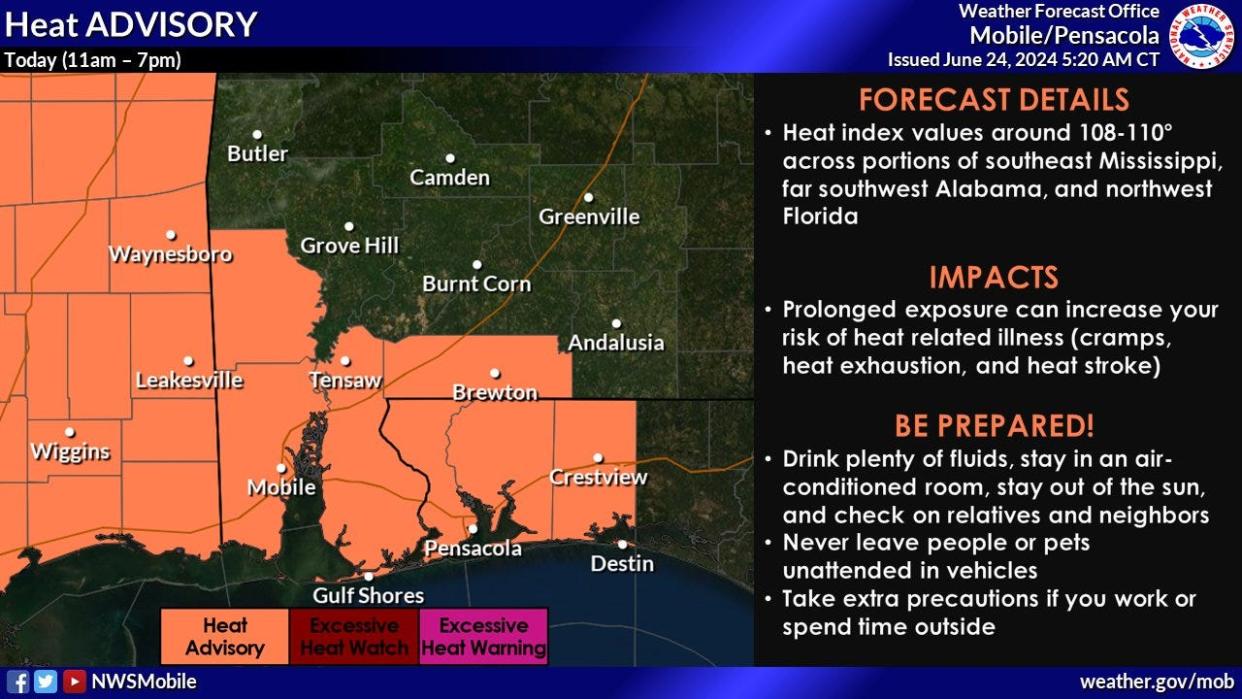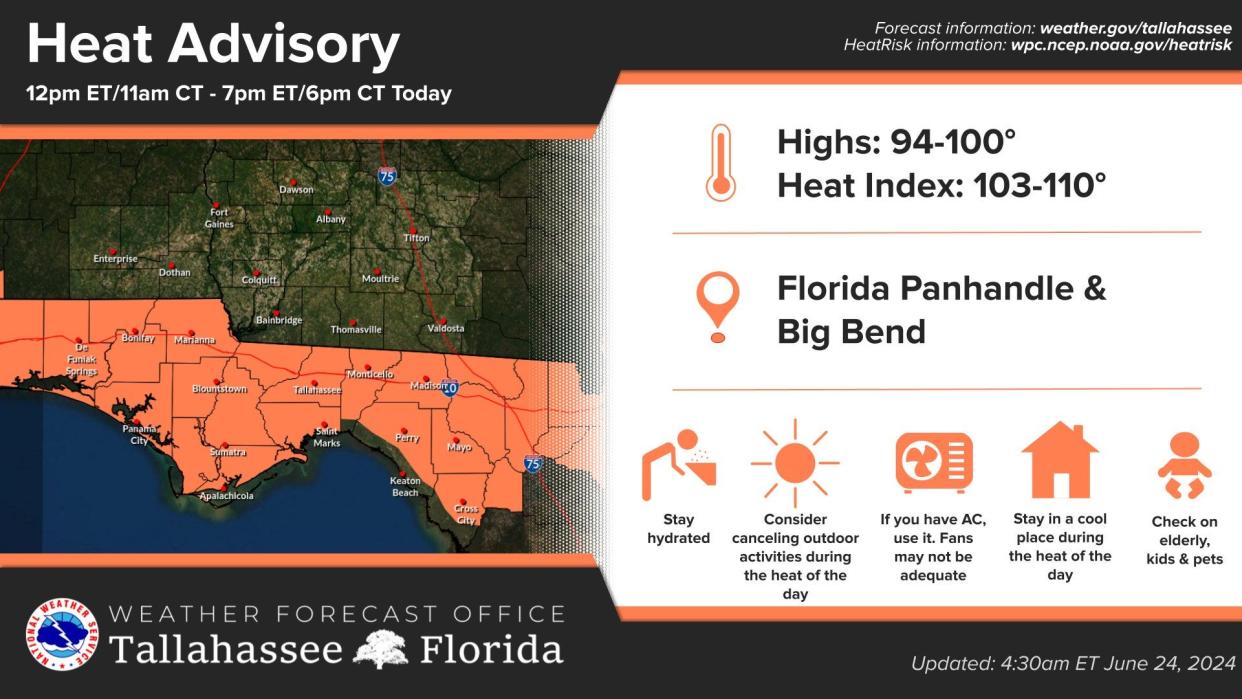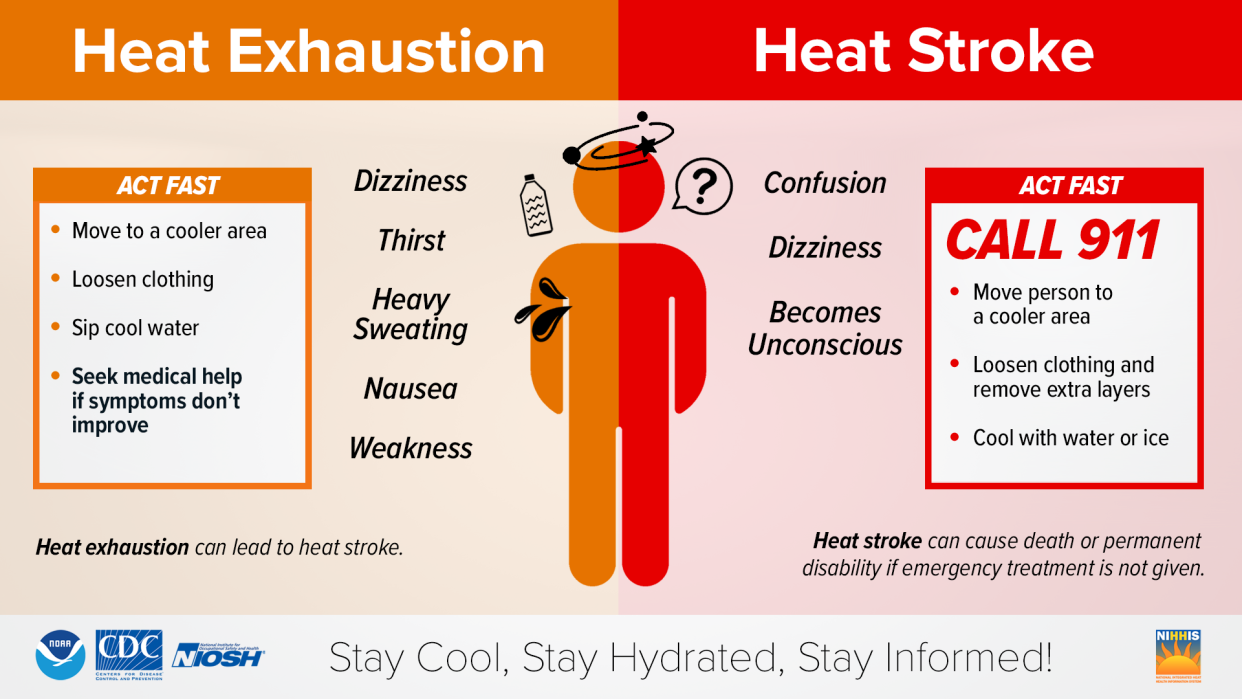'Dangerous heat' forecast for several Florida counties. Here's what you should know
"Dangerous heat is expected once again today," the National Weather Service Tallahassee warned Monday morning.
Several counties across North Florida and the Panhandle are under heat advisories today as temperatures rise and the heat index soars in some places up to 110.
A heat advisory is issued whenever extremely dangerous heat conditions are expected.
Heat is a killer, and the Centers for Disease Control reported about 1,220 people in the United States are killed by extreme heat every year.
Weather alerts issued in Florida
Florida counties under a heat advisory

Northwest Florida: Including Escambia, Santa Rosa, Okaloosa, Washington counties.
When: 11 a.m. to 7 p.m. CDT Monday, June 24.
Heat index: up to 108

North Florida: Including Leon, Walton, Holmes, Washington, Jackson, Bay, Calhoun, Gulf, Franklin, Gadsden, Jefferson, Madison, Liberty, Wakulla counties.
When: Noon to 7 p.m. EDT Monday, June 24.
Heat index: up to 110
Northeast Florida: Including Suwannee, Baker, Nassau, Union, Bradford, St. Johns, Gilchrist, Flagler, Hamilton, Duval, Clay, St. Johns counties.
When: 1 pm. to 7 p.m. EDT Monday, June 24.
Heat index: up to 109
What is a heat advisory?
A heat advisory is one of several types of health alerts issued by the National Weather Service. A heat advisory is issued within 12 hours of the onset of extremely dangerous heat conditions.
In Florida, except for Miami-Dade County, the National Weather Services offices around the state would issue a heat advisory if the heat index is expected to reach 108 to 112 degrees. The National Weather Service Miami said Miami/Dade County wanted a lower threshold for an advisory for its population, which was set at 105 degrees.
If a heat advisory is issued, take precautions to avoid heat illness. If you don't take precautions, you may become seriously ill or even die.
What types of heat warnings does NWS issue?
The National Weather Service issues several types of heat-related advisories, including:
Excessive heat warning: An excessive heat warning is issued within 12 hours of the onset of extremely dangerous heat conditions. If you don't take precautions immediately when conditions are extreme, you may become seriously ill or even die.
Excessive heat watch: Heat watches are issued when conditions are favorable for an excessive heat event in the next 24 to 72 hours. A watch is used when the risk of a heat wave has increased but its occurrence and timing is still uncertain.
Heat stroke vs heat exhaustion: How to tell the difference

When your body can't cool itself, your body temperature rises. If it goes too high, it can be life-threatening.
The Centers for Disease Control and Prevention provided a list of warning signs and symptoms of heat-related illnessesand what you should do.
Heat cramps
Heat cramps may be the first sign of heat-related illness, and may lead to heat exhaustion or stroke.
Symptoms: Painful muscle cramps and spasms usually in legs and abdomen and heavy sweating.
First aid: Apply firm pressure on cramping muscles or gently massage to relieve spasm. Give sips of water unless the person complains of nausea, then stop giving water.
Seek immediate medical attention if cramps last longer than 1 hour.
Heat exhaustion
Symptoms: Heavy sweating, Weakness or tiredness, cool, pale, clammy skin; fast, weak pulse, muscle cramps, dizziness, nausea or vomiting, headache, fainting,
First aid: Move person to a cooler environment, preferably a well-air-conditioned room. Loosen clothing. Apply cool, wet cloths or have person sit in a cool bath. Offer sips of water. If person vomits more than once seek immediate medical attention if the person vomits, symptoms worsen or last longer than 1 hour.

Symptoms: Throbbing headache, confusion, nausea, dizziness, body temperature above 103°F, hot, red, dry or damp skin, rapid and strong pulse, fainting, loss of consciousness.
First Aid: Call 911 or get the victim to a hospital immediately. Heat stroke is a severe medical emergency. Delay can be fatal.
Move the victim to a cooler, preferably air-conditioned, environment. Reduce body temperature with cool cloths or bath. Use fan if heat index temperatures are below the high 90s. A fan can make you hotter at higher temperatures.
Do not give fluids.
This article originally appeared on Treasure Coast Newspapers: NWS issued heat advisories Florida. Heat index 110
